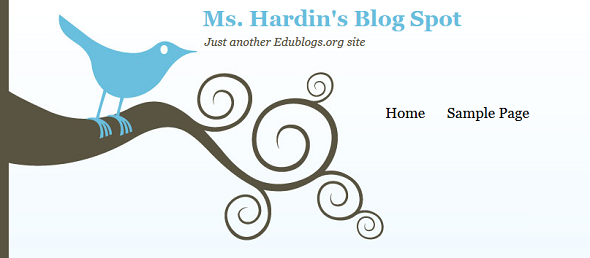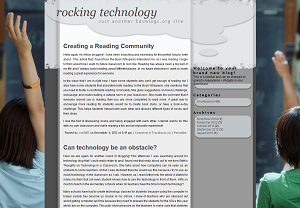You may have blogged to share travel adventures, details of daily life with family and friends living far away, or maybe even to promote your small business. But have you ever blogged as part of your formal education?
In Mason’s EDCI 546 Integration Technology in Elementary Classrooms: Literacy, that is exactly what students do. Research in the Journal of Computer Assisted Learning suggests that two vital ways that blogging fosters learning are by 1) providing an ideal atmosphere for students to participate in learning communities and 2) offering an effective method to support reflective learning [1].
Engagement in the world through learning communities encourages intellectual progress according to educational researcher E. Wenger [2]. With this in mind, EDCI 546 Professor Debra Sprague and Instructional Designer Joe DiPietro created a course capable of connecting students to a world-wide community of K-6 educators.

Ms. Hardin, an elementary school intern and Mason student, shares thoughts on her blog about
education topics such as finding resources online, using technology in the classroom,
art in the classroom, and podcasts.
Sprague and DiPietro integrated activities in the curriculum such as reading blogs that focus on literacy and technology issues, contributing to discussions on these blogs, maintaining a personal blog, and writing fan fiction stories to share online. Students who complete these activities gain knowledge as they actively engage in the world and work on mutual goals with others.
When EDCI 546 student Ms. Hardin tapped into the blogosphere, she discovered a lively community of teachers exchanging teaching practices which could help her achieve her classroom goals. One of her goals was to integrate art into literacy. One blog that Ms. Hardin reviewed gave her the idea to have students make a cover picture for the story they read or draw images of book characters.
EDCI 546 students design and create digital stories for
their future K-6 students. Video courtesy of Ms. Hardin.
“One of my favorite ideas off of the blog was that the artist did a whole unit on drawing fish from Dr. Seuss books,” declared Ms. Hardin. “My kindergartners are getting ready to read and learn all about Dr. Seuss books and this would be so much fun for their art center.”
Ms. Hardin did not just take great ideas from other teachers but actively collaborated, sharing her great ideas through blogging. On Ms. Hardin’s Blog Spot, anyone can access her digital story called “Cookies”, which she initially created for her own students.
Additionally, Ms. Hardin and her classmates in the EDCI 546 class composed fan fiction stories that teachers, students, and parents from anywhere can read any time at the Kid Fan Fiction website.
Another EDCI 546 student, Cara, proved that blogging supports reflective learning. Reflective learning is a “process meant to increase understanding and provide direction for further exploration” [3].
In one of her rocking technology blog posts, Cara discussed an article that made her reflect on what she wanted her future classroom to look like and how to make reading a great
experience for each of her students.
“A great way to encourage more reading for students would be to create book clubs or have a book-a-day challenge. This helps students interact with each other and discuss different types of books and their ideas,” says Cara. “I cannot wait to do this with my own classroom and make reading a fun and an enjoyable experience!” she exclaimed.
As Cara reminds us, learning should be fun. As the EDCI 546 course exemplifies, Mason online courses have the potential to use fun activities such as blogging to help students learn effectively. Check out Mason online course listing page to find the right online course for you! Or sign onto Patriot Web to register for an online course.
References:
[1] Kerawalla, L., Minocha, S., Kirkup, G., & Console, G. (2009). An empirically grounded framework to guide blogging in higher education. Journal of Computer Assisted Learning, 25, 31-42.
[2] Wenger, E. (1998). Communities of practice: Learning, meaning, and identity. New York, NY: Cambridge University Press.
[3] Horvitz, B. & Vellom, R. (2012). Using blended learning to enhance reflective practice among science teachers. National Teacher Education Journal, 5(3), 77-83.



